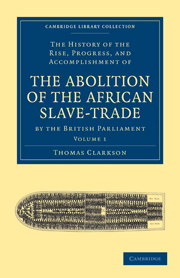Book contents
Summary
The second class of the forerunners and coadjutors in this great cause up to May 1787 will consist of the Quakers in England.
The first of this class was George Fox, the venerable founder of this benevolent society.
George Fox was cotemporary with Richard Baxter, being born not long after him, and dying much about the same time. Like him, he left his testimony against this wicked trade. When he was in the island of Barbadoes, in the year 1671, he delivered himself to those who attended his religious meetings, in the following manner:—
“Consider with yourselves,” says he, “if you were in the same condition as the poor Africans are—who came strangers to you, and were sold to you as slaves—I say, if this should be the condition of you or yours, you would think it a hard measure; yea, and very great bondage and cruelty. And therefore consider seriously of this; and do you for them, and to them, as you would willingly have them, or any others do unto you, were you in the like slavish condition, and bring them to know the Lord Christ.” And in his Journal, speaking of the advice, which he gave his friends at Barbadoes, he says, “I desired also, that they would cause their overseers to deal mildly and gently with their Negros, and not to use cruelty towards them, as the manner of some had been, and that after certain years of servitude they should make them free.”
- Type
- Chapter
- Information
- The History of the Rise, Progress, and Accomplishment of the Abolition of the African Slave-Trade by the British Parliament , pp. 110 - 130Publisher: Cambridge University PressPrint publication year: 2010First published in: 1808

